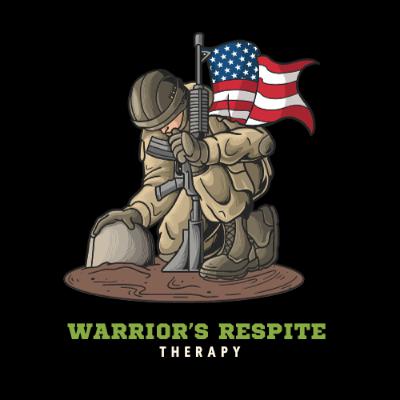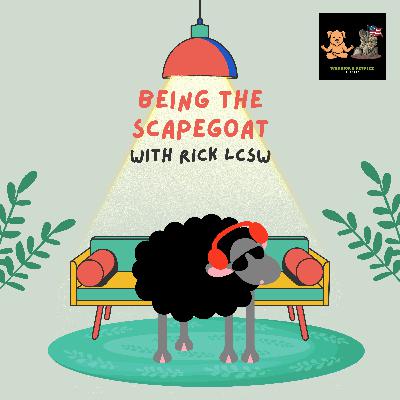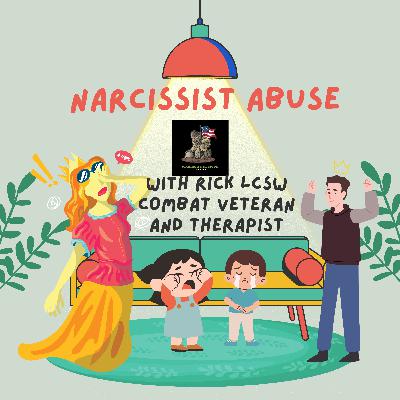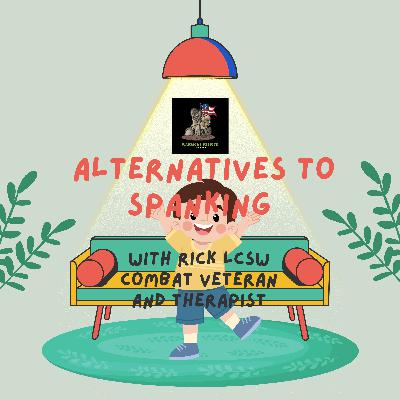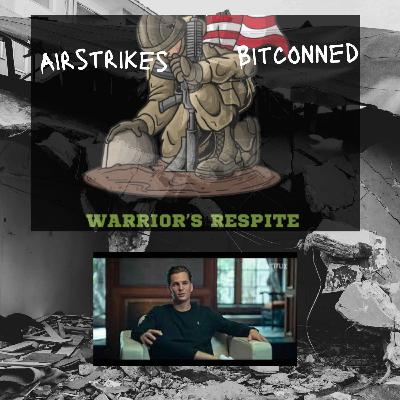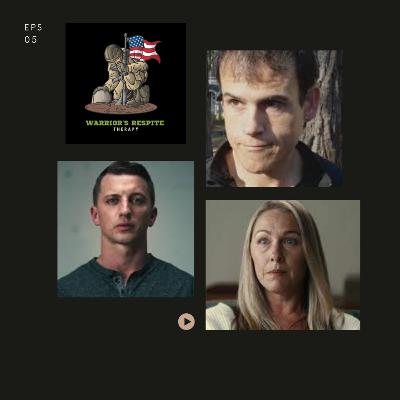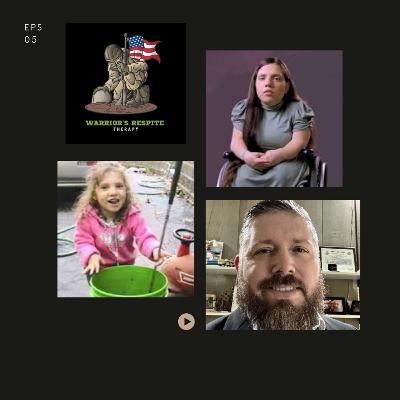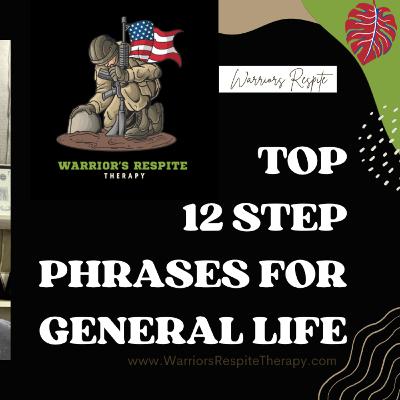Discover Warrior’s Respite
Warrior’s Respite

Warrior’s Respite
Author: Rick Rodgers
Subscribed: 0Played: 0Subscribe
Share
© Rick Rodgers
Description
Warrior's Respite: Embrace strength, heal trauma, recover from addiction. Join us on a transformative journey as we explore the intersection of warrior spirit and healing. Through candid conversations and expert insights, discover the power of resilience, self-discovery, and growth. Find solace, tools, and inspiration to overcome adversity and unlock your potential. Heal, grow, and thrive with the Warrior's Respite podcast.
26 Episodes
Reverse
SummaryIn this conversation, Rick, a therapist and combat veteran, discusses the societal pressures surrounding legitimacy and the high costs of education and credentialing in the fields of therapy and yoga. He critiques the system that prioritizes titles and degrees over genuine healing and self-worth, emphasizing that true validation comes from within rather than from external accolades. Rick encourages listeners to break free from societal expectations and recognize their inherent value.Keywordslegitimacy, education, credentialing, therapy, social work, yoga, societal expectations, mental health, self-worth, empowerment
In this conversation, Rick, a therapist and yoga instructor, shares his personal journey of healing from trauma and the importance of integrating ancient wisdom into modern therapeutic practices. He discusses the role of yoga and meditation in emotional processing, the impact of gaslighting on mental health, and the significance of developing a healthy ego. Rick emphasizes the scientific backing of yoga and meditation as effective tools for mental health and encourages listeners to embrace these practices as a lifestyle for holistic well-being.takeawaysRick shares his personal journey of healing from trauma.He emphasizes the importance of ancient wisdom in modern healing.Yoga and meditation are presented as essential tools for emotional processing.Rick discusses the impact of gaslighting on mental health.He advocates for developing a healthy ego through restorative fitness.The conversation highlights the scientific benefits of yoga and meditation.Rick encourages listeners to practice mindfulness and awareness.He stresses the importance of being present and processing emotions.Rick believes that everyone is born perfect and has the potential to heal.The discussion concludes with a call to action for listeners to embrace yoga and meditation.WarriorsRespiteTherapy.com
In this conversation, Rick shares his personal experiences with PTSD and the challenges he faces as a veteran. He recounts a traumatic incident at a football game that escalated due to his PTSD, highlighting the misunderstandings surrounding the condition. Rick also discusses the impact of growing up in a narcissistic family, the complexities of navigating relationships with narcissistic individuals, and the importance of self-empowerment and healing.
In this conversation, Rick, a meditation and yoga coach, discusses the importance of feeling heard and finding peace within oneself. He explores the reasons why people may feel unheard, such as fear of others' reactions or growing up without a voice. Rick emphasizes the need to assess the situation and determine if it's rational to be heard, and suggests ways to unblock the throat chakra. He also discusses the options of leaving toxic situations, accepting the things we cannot change, and seeking help through therapy and self-care. Rick shares his personal journey of finding healing and self-love through mental health practices.
SummaryIn this conversation, Rick discusses the topic of defending narcissistic parents. He explains what narcissism is and how it is often rooted in trauma. Rick provides a checklist to identify if someone is a narcissist and shares personal experiences of being raised by narcissistic parents. He explores the reasons why people defend narcissistic parents, including guilt and manipulation. Rick also delves into the concept of trauma bonding and the impact of complex PTSD. He highlights the importance of education, therapy, and setting boundaries when dealing with narcissistic parents.#narcissisticparents, #narcissism, #trauma, #checklist, #guilt, #manipulation, #trauma bonding, #complex #PTSD, #education, #therapy, #boundaries
Deadpool and Wolverine is the third installment of the Deadpool franchise and the X-Men franchise. The movie successfully brings together the worlds of Fox and Disney Marvel, with plenty of jokes and references to both. It explores the challenge of honoring Hugh Jackman's Wolverine while also desecrating the character in a humorous way. The movie features a redemption arc for Wolverine and a larger-than-life version of the character with a bigger chip on his shoulder. It serves as a love letter to the Fox universe and sets the stage for Deadpool's future in the Marvel universe.keywordsDeadpool, Wolverine, franchise, Fox, Disney Marvel, humor, redemption arc, love letter, futuretakeaways
Deadpool and Wolverine successfully combines the worlds of Fox and Disney Marvel with humor and references to both franchises.
The movie explores the challenge of honoring Hugh Jackman's Wolverine while also desecrating the character in a humorous way.
It serves as a love letter to the Fox universe and sets the stage for Deadpool's future in the Marvel universe.
The movie features a redemption arc for Wolverine and a larger-than-life version of the character with a bigger chip on his shoulder.
A Love Letter to the Fox Universe
Honoring and Desecrating Wolverine
"This was officially Deadpool kind of making his way to Disney Marvel."
"They were able to bring in Hugh Jackman while honoring and also desecrating Wolverine at the same time with plenty of laughs."
"This was a love letter to Fox."
This conversation explores the topic of narcissism and narcissistic abuse. The host discusses the different types of narcissism, including vulnerable narcissism and grandiose narcissism. They explain how narcissists seek control and manipulate others, often taking advantage of the love and trust they receive. The conversation also touches on the impact of narcissistic abuse on children and spouses, as well as the symptoms of complex PTSD that can arise from such relationships. The host emphasizes the importance of recognizing and acknowledging narcissistic behavior in order to begin the healing process.Keywordsnarcissism, narcissistic abuse, vulnerable narcissism, grandiose narcissism, control, manipulation, love, trust, impact, complex PTSD, healingTakeaways
• Narcissism is not just about being self-centered or vain; it involves seeking control and manipulating others.
• Narcissistic abuse can have a significant impact on children and spouses, leading to complex PTSD and various emotional and behavioral symptoms.
• Recognizing and acknowledging narcissistic behavior is crucial for healing and breaking the cycle of abuse.
• Therapy and support from professionals who understand narcissistic abuse can be helpful in the healing process.
• "We need to get the word out about narcissism, narcissistic abuse."
• "Narcissism is about control and doing anything for control over other people."
• "Gaslighting is just a way to make you feel like you're freaking nuts."
Chapters
00:00Introduction and Importance of Discussing Narcissism
04:02The Impact of Narcissistic Abuse on Children and Spouses
07:42Recognizing and Addressing Gaslighting
13:30Breaking the Cycle of Narcissistic Abuse
26:00Conclusion and Encouragement to Face the Truth
Yoga, mindfulness, and meditation can greatly help stress, anxiety and stress. It is something that should be done daily. In this podcast, Rick discusses the benefits of a daily practice and how it changes your life.
I am a social worker and veteran with a passion for helping others on their healing journey. In this episode of Warriors Respite, we'll dive deep into the world of narcissistic abuse and toxic relationships, exploring the telltale signs of a narcissist, the impact of narcissistic parenting on children, and the steps to take to break free from the cycle of abuse. Drawing from my own experiences and insights, I'll share valuable knowledge and tools to help you or a loved one overcome the challenges of narcissistic abuse and create a healthier, happier future. Join me as we navigate the path to healing and rebuilding a life of confidence and resilience.
Last episode I talked about why I don't like spanking. I'm sure if a lot of people listened, they might of not liked it. People protect spanking their kids. They rationalize it even though there is no scientific evidence behind the act of spanking, and the idea of inflicting pain on any other human in this world is illegal except your child. Just seems odd to me. So if I'm going to tell you it's a good idea not to spank your child, I'm going to present to you alternatives, just like I'd do with my child.
I'm going to explain why I'm against spanking. People hold onto spanking like it's the word of God. I'm sorry but I flat out disagree. You just don't hit people you love. In this podcast I explain why.
I'm a veteran and Social Worker. In future episodes I will talk about alternatives to spanking.
Rick rants about how disgusted he is by American war machine and justice/court system. That's it... that's the summary.
Links to Rick's socials, pods, blogs and vlogs: https://linktr.ee/warriorsrespitetherapy
Find all my links here---> https://linktr.ee/warriorsrespitetherapy
In this conversation, Rick discusses the Gone Girl case that occurred in 2015 and highlights the failures of the police and the justice system. The case involves Quinn's account of a group of intruders kidnapping his girlfriend Denise, but the police immediately suspect Quinn and emotionally abuse him during interrogation. Denise is later dropped off at her childhood home, but the police accuse her of making up the story. The media compares the case to the movie Gone Girl, further victimizing Denise. Denise reveals the horrifying details of her captivity and sexual assault. The kidnapper admits to kidnapping the wrong woman and sexually assaulting Denise. The police fail to investigate other incidents and dismiss Denise's claims. The FBI eventually intervenes and realizes the police had it wrong. Rick emphasizes the impact of sexual abuse and personal experiences, criticizes the injustice and victim-blaming, and calls for accountability and reform in law enforcement.Takeaways
The Gone Girl case highlights the failures of the police and the justice system in handling cases of sexual assault and kidnapping.
Victims of sexual assault often face disbelief, victim-blaming, and emotional abuse from law enforcement and the media.
The media's portrayal of cases can further victimize and harm survivors, perpetuating harmful stereotypes and biases.
There is a need for improved training, accountability, and reform within law enforcement to ensure proper investigation and support for survivors.
This conversation discusses the Casey Anthony trial and its recent updates. It covers the timeline of events, the discovery of Kaylee's remains, Casey Anthony's murder trial, the verdict and sentencing, life after the trial, a new documentary and allegations, assessing the allegations, lie detector tests, Casey Anthony's net worth, and lessons learned. The conversation concludes by addressing the backlash and the need to move on from the case.
The Casey Anthony trial and its aftermath continue to generate public interest and controversy.
The timeline of events surrounding the disappearance and death of Kaylee Anthony is discussed, including the discovery of her remains.
The details of Casey Anthony's murder trial, including the defense's claims and the prosecution's evidence, are examined.
The verdict and sentencing of Casey Anthony, as well as her life after the trial, are explored.
The recent documentary and allegations made by Casey Anthony are analyzed, along with the importance of assessing the credibility of these claims.
The use of lie detector tests and their limitations in determining the truth are discussed.
Casey Anthony's net worth and the lessons that can be learned from this case are considered.
The conversation concludes by addressing the backlash surrounding the case and the need to move on from it.
This conversation discusses the life and downfall of Tammy Lynn Sinch, a former pro wrestler known as Sunny. The chapters cover her background, rise to fame, transition to different wrestling promotions, competition with Sable, and her subsequent troubles with the law and substance abuse. The conversation also explores the possibility of a personality disorder and criminal thinking. The main takeaway is the importance of taking responsibility and making better choices to avoid destructive behaviors.Takeaways
• Tammy Lynn Sinch, also known as Sunny, was a former pro wrestler who experienced a significant downfall in her life.
• Her rise to fame in the wrestling industry was followed by a series of troubles, including substance abuse and legal issues.
• The conversation highlights the possibility of a personality disorder and criminal thinking contributing to her destructive behaviors.
• The main takeaway is the importance of taking responsibility and making better choices to avoid a similar path of self-destruction.
Follow my links here: https://linktr.ee/warriorsrespitetherapy
This conversation discusses the curious case of Natalie Grace, a child who was adopted but later discovered to be an adult. The conversation highlights the neglect and abuse she experienced at the hands of her adoptive family, as well as the failures of the court system and social workers involved. The chapters cover topics such as the background of the case, the discovery of Natalia's true age, the mistreatment she endured, and the lack of accountability for those responsible. The conversation emphasizes the importance of taking care of each other and offers pro bono services to Natalia.
Takeaways
The case of Natalie Grace highlights the failures of the court system and social workers in protecting vulnerable individuals.
Neglect and abuse can have long-lasting effects on a person's mental and emotional well-being.
It is important to hold individuals accountable for their actions and to support those who have experienced trauma.
SummaryIn this conversation, Rick discusses the importance of expressing our feelings and the fear of being shut down. He explores how trauma can impact our ability to express emotions and the need to validate our own feelings. Rick emphasizes the journey of self-improvement and the goal of being the best version of ourselves. He mentions the influence of Mr. Rogers and the importance of acknowledging and processing our emotions. Rick also highlights the value of honest therapy and the practice of mindfulness in emotion processing. He addresses the challenges of dealing with narcissistic parents and the significance of surrounding ourselves with supportive people. Rick concludes by encouraging self-compassion and learning from our mistakes.Takeaways
• Expressing our feelings is important, even if we fear being shut down by others.
• Trauma can impact our ability to express emotions, but it is crucial to validate our own feelings.
• The journey of self-improvement is ongoing, and there is no end point to reaching perfection.
• Acknowledging and processing our emotions, especially related to trauma, is essential for healing.
• Finding a therapist who is honest and supportive can greatly aid in personal growth and emotional processing.
• Surrounding ourselves with supportive people who validate our emotions is crucial for our well-being.
• Self-compassion and learning from our mistakes are key aspects of personal growth and becoming a better person.
In a fast-paced world filled with constant demands and challenges, it's no surprise that many of us experience anxiety at various points in our lives. Join us on Warrior's Respite as we dive deep into understanding what anxiety truly is and explore effective strategies for living with it.
Hosted by Rocl Rodgers, a licensed therapist specializing in trauma and addiction, this podcast is a safe space for open conversations about the complexities of anxiety. Each episode brings you expert insights, personal anecdotes, and practical advice to help you gain a clearer understanding of anxiety and its impact on our lives.
Whether you're someone who experiences anxiety firsthand or you're looking to support a friend or family member, this episode offers valuable perspectives that can guide you towards finding balance and resilience. We'll cover topics like differentiating between normal worry and clinical anxiety, debunking common misconceptions, mindfulness techniques, cognitive-behavioral strategies, and fostering a supportive environment.
Join us as we embark on a journey to demystify anxiety, destigmatize the conversation around mental health, and learn how to not only cope but thrive while navigating the ups and downs of life. Subscribe now to start your journey towards a healthier relationship with anxiety. Remember, you're not alone on this path—Warrior's Respite is here to accompany you every step of the way.
#mentalhealth #values #Bears #Bulls #Chicago #Cubs #Sox
In this conversation, Rick discusses the toxic behavior and personal attacks that occur within sports fan bases, particularly in Chicago. He highlights instances of extreme negativity, such as wishing death on others and booing innocent individuals. Rick emphasizes the importance of personal accountability and making amends for hurtful actions. He also explores the negative impact of social media addiction and online arguments on mental health. Rick calls for a change in fan behavior and urges individuals to disconnect from online negativity.Takeaways
• Extreme negativity, such as wishing death on others and booing innocent individuals, is unacceptable and reflects a lack of personal accountability.
• Social media addiction and online arguments can have a detrimental impact on mental health.
• It is important to disconnect from online negativity and prioritize in-person relationships.
#12step #mentalhealth #addictionrecovery
Rick, a therapist and trauma counselor, discusses various sayings from the 12-step program and how they can be applied to life in general. He emphasizes the importance of keeping things simple and not overcomplicating tasks. Rick also talks about the concept of taking life one day at a time and focusing on the present moment. He highlights the idea of progress, not perfection, and the importance of cultivating an attitude of gratitude. Rick encourages listeners to take what is useful to them and leave the rest, and to live and let live. He also discusses the significance of owning one's secrets and practicing humility. Rick concludes by reminding listeners to live life on life's terms and to keep coming back to the things that bring them joy and growth.
Takeaways
Keep things simple and avoid overcomplicating tasks.
Focus on the present moment and take life one day at a time.
Embrace progress, not perfection, and cultivate an attitude of gratitude.
Take what is useful to you and leave the rest.
Practice humility and own your secrets.
Live life on life's terms and keep coming back to what brings you joy and growth.
Website: WarriorsRespiteTherapy.com
Twitter: @LBRTSocialWork
Facebook: https://www.facebook.com/warriorsrespitetherapy
Instagram: https://www.instagram.com/rick_lcsw/
TikTok: https://www.tiktok.com/@warriors_respite






